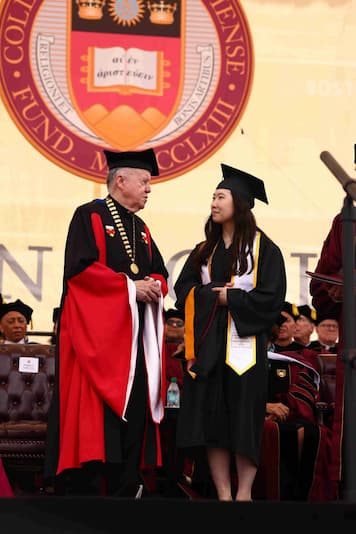
Hayoung Cho receives BC's highest undergraduate Commencement honor
Characterized by instructors and advisors as possessing an unyielding thirst for knowledge, with a health care vocation grounded in both science and empathy, Hayoung Cho is the recipient of the 2025 Edward H. Finnegan, S.J., Award as the graduating senior who best exemplifies Boston College’s motto, “Ever to Excel.”
The Morrissey College of Arts and Sciences grad and South Korean native was presented with the honor by University President William P. Leahy, S.J., at Commencement Exercises on May 19.
“I am tremendously fortunate and blessed to have been selected for this award,” said Cho in a recent interview. “The moment I found out I was nominated, I immediately thought of everyone who contributed to my miraculous journey at Boston College. The award symbolizes the countless moments of support and encouragement from my parents, mentors, and peers, who inspired me to dream big. I am incredibly lucky and humbled by the honor and will cherish it for a lifetime.”
A double major in Human-Centered Engineering and chemistry who earned a remarkable 163 credits while maintaining a nearly perfect 4.0 GPA, Cho is a member of the Gabelli Presidential Scholars program and part of BC’s first cohort of HCE graduates.
“Hayoung embodies cura personalis in all she does,” said Morrissey College Associate Dean Thomas Mogan. “Whether advocating for Alzheimer’s policy reform with local legislators, mentoring peers, or engaging in BC’s community life with humility and quiet determination, she is a woman of integrity, thoughtfulness, and purpose. She is a scholar and servant leader of extraordinary promise, and an excellent role model for all BC students who strive to live lives of meaning and purpose.”
Cho’s outstanding academic rigor has earned her recognition as a Sophomore Scholar, Dean’s Scholar, and induction into honor societies Phi Beta Kappa, Alpha Sigma Nu, and Iota Sigma Pi. She is a semi-finalist for a Fulbright Research Grant to continue her biomedical research with Mass General Hospital in Ghana.
As a researcher, Cho has undertaken several projects with real-world impact. In partnership with Brigham and Women’s Hospital and institutions in Ethiopia, she tackled global health challenges, developed neonatal nutrition monitoring systems, and traveled to the East African country to train local medical staff.
Under the guidance of Mass General Hospital, Cho assisted in the development of biosensor technologies and published results from a cancer research project in the peer-reviewed journal Nature Biotechnology. While at the University of Oxford, she contributed to pioneering work on microbubble technology—an innovative field that involves the creation and application of tiny, gas-filled bubbles—in lung surfactants, which line the inner surface of the organ’s air sacs.
According to Mogan, “her sustained engagement in biomedical science and engineering reflects an impressive maturity, vision, and desire to serve others through the integration of knowledge and compassion.”
A co-founder and president of BC’s Engineers Without Borders chapter, Cho led a multi-year, interdisciplinary initiative to provide clean water access to a Tanzanian village, spearheading the engineering design and fundraising efforts, and forming global partnerships that called for solidarity and global justice. Her leadership at the Schiller Institute for Integrated Science and Society and the SSC Venture Studio—an arm of a BC alumni-managed venture fund that provides resources and support for students to launch and grow their startups—along with her work as a teaching assistant for several courses, further reflected her passion for community building and mentoring.
Cho’s desire to serve also encompasses Boston’s most vulnerable populations. Extending her PULSE service commitment to over three years, she volunteered at the Boston Health Care for the Homeless Program and Mass General Brigham, exemplifying the Jesuit mission of being “men and women for others.”
“Growing up, I vividly remember seeing my family give back to their communities,” said Cho. “They showed me how to freely love another, do good work in the community, and acknowledge our blessings. My desire to give back blossomed when I came to BC. As I served patients at the St. Francis House Foot Clinic and worked with students and professionals to implement a borehole project in Mkutani, Tanzania, I was reminded of the love that I received and the impact that care and respect can have. Serving others and applying my education to real-world challenges felt like a natural fulfillment of cura personalis.”
“Through every obstacle, I felt unwavering support from everyone around me. They inspired me to strive higher and gave me a profound sense of purpose in my life. BC has provided me opportunities to shape not just my skills, but transform my heart, mind, and soul in ways that have given me a clear direction and fiery passion.”
2025 Finnegan Award winner Hayoung Cho
From the moment she stepped off the plane in Boston, Cho recalled, she was resolved to become the best version of herself.
“I wanted to welcome every challenge as an opportunity to learn, find joy in life’s small moments, and live each day with intention,” she said. “As a member of the HCE major’s inaugural class, I was thrilled to be accepted into a closely knit community and to collaborate across disciplines to solve real-world problems. Learning about the critical issues in environment, health, and energy, I now aspire to serve the world’s evolving needs as a responsible global citizen and physician-scientist.”
She credits her BC mentors for their guidance along the way, including Danielle Taghian, a professor of the practice in biology; Kathleen Bailey, professor of the practice in political science and director of the Gabelli Presidential Scholars Program; Glenn R. Gaudette, the John W. Kozarich ’71 Chair of the Department of Engineering; Kenneth R. Metz, a professor of the practice in chemistry; Lorenzo Alexander L. Puente, a professor of the practice in English; and Hakho Lee, a professor of radiology at Harvard Medical School, and director of the Biomedical Engineering Program at the Center for Systems Biology at Massachusetts General Hospital. One advisor, however, particularly stood out.
“[Ferrante Family Assistant] Professor Bryan Ranger has been my greatest role model, a true superstar whom I looked up to every day,” said Cho of Ranger, an Engineering faculty member. “I’m so grateful to have met and researched with him since my first year.”
Cho said her four years at BC—a blend of rigorous learning and a caring community—has left an indelible impression on her.
“Through every obstacle, I felt unwavering support from everyone around me. They inspired me to strive higher and gave me a profound sense of purpose in my life. BC has provided me opportunities to shape not just my skills, but transform my heart, mind, and soul in ways that have given me a clear direction and fiery passion.”
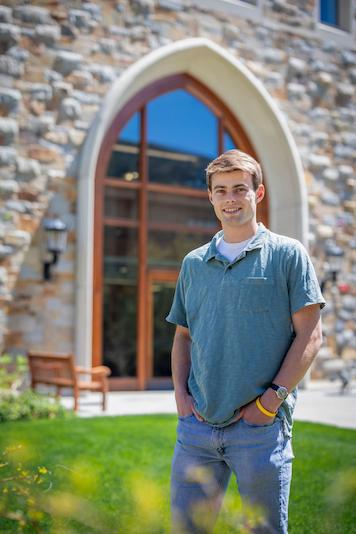
Class of 2025: Seniors to Remember Charlie Neill | Morrissey College of Arts and Sciences
Charlie Neill, Morrissey College of Arts and Sciences
Hometown: Washington, D.C.
Major: Engineering
Notable Activities/Achievements: 4Boston teaching assistant and student leader at Jackson Mann Community Center in Allston, Mass.; Vice President of BC club rugby team; Undergraduate Research Fellow in lab of Ali Salifu (Engineering); study-abroad semester in Sydney; summer volunteer with Jesuit Refugee Service in Luxembourg.
Mentors: Ali Salifu and Siddhartan Govindasamy (Engineering)Post-Graduation Plans: Design engineer at Acorn Engineering Inc. in Portland, Me.
Charlie Neill cites his childhood passion for tinkering as fueling his interest in engineering, and his experience at a Jesuit high school with inspiring a love for formative education. He’s been able to combine the two as part of the first cohort of students in Boston College’s Human-Centered Engineering program that will graduate on May 19. A member of the Gabelli Presidential Scholars Program, he has explored engineering as his vocation while nurturing his personal and spiritual dimensions through community service in the Boston area and abroad.
Apparently, you were born an engineer—is that right?
You could probably say that. As a kid, I liked to tinker with things around the house or in the yard. One of my favorite things that I built was a trebuchet that I used to throw pebbles across our backyard. I had a copy of the book Backyard Ballistics, which my friends and I used to make things like potato cannons and tennis ball mortars. That last one always scared my mom a bit, but I was always doing things like that when I was younger.
Why study engineering at Boston College?
I loved my experience at the Jesuit high school I went to, so I wanted to continue that with a Jesuit education in college. When I heard that BC was launching an engineering program it just felt like the perfect fit.
As a soon-to-be graduate of the Human-Centered Engineering program, I can say I’ve loved my experience here. I’ve become close with many of my professors, especially the ones I’ve had in my project-based courses. Being part of the first cohort, I’ve gotten used to the syllabus disclaimer that reminds us that “this class has never been offered before.” But honestly, being included in the creation of a new program only made my experience richer and made me feel like I really left my mark on the department.
I’ve also loved how collaborative this program is. All the engineers in my grade know each other, share knowledge, and work together, especially because we have so much project-based learning. It’s been amazing to see the program grow over my time here, and I’ll be thrilled to see how it continues to evolve.
Were you able to apply what you learned in the classroom?
Absolutely. Last summer, I interned with the Gulf of Maine Research Institute in Portland, Me., on documenting innovations in aquaculture, which involved writing about creative technology on oyster, scallop, and kelp farms. I was able to see the complexity of issues on the working waterfront, and published articles for a variety of audiences. My capstone engineering project was to design an automated rain gauge for the National Weather Service to use in their community science outreach. I think the combination of engineering design with a positive social impact is exactly what my major is all about.
What service opportunities have you pursued?
I joined 4Boston, one of the service clubs on campus, during my first year at BC. I’ve been a teaching assistant at the Jackson-Mann Community Center, tutoring adults learning English. As a student leader this past year, I took on a role organizing service and weekly reflection sessions for a small group of BC students. Being part of the Jackson-Mann and 4Boston communities has been a great way to get off campus and meet new and fantastic people.
You’ve gone abroad during your years at BC, too.
I studied for a semester in Australia, where I took courses in wind energy, environmental engineering, and Aboriginal Australian history. I also spent a summer in Luxembourg volunteering for the Jesuit Refugee Service (JRS) and practicing my French. I helped staff JRS’s community center, basically a “living room” where people could come in for tea and snacks, to socialize, to play games, and to take a break from the refugee camp. I also helped organize a summer program for unaccompanied minors, where I became close with a lot of the kids.
Even though it wasn’t related to engineering at all, this gave me a lot of perspective on what’s important to me going forward. I realized how much I value being able to work face-to-face with people, and traveling somewhere new by myself gave me more confidence to try living in new places in the future.
And somehow you found the time to be involved in club rugby, too?
I started playing rugby in high school, and was glad to continue at BC. It’s a great community, and I love the sport. One of my favorite things about rugby is that really anyone can play. At BC we have two teams: the more competitive A side, and developmental B side. As the vice-president of the team this past year, I organized a B-side-only tournament to bring some competitive spirit to all the guys on the team. We called it “The B-Pot”—a play on the Beanpot—and played on the new rugby field on the Messina College campus. We even took home the inaugural trophy!
You’ve got a job lined up already. Do you see it as a continuation of what you’ve done at BC?
Yes, I’ll be working at Acorn Engineering in Portland as a design engineer. One of the things I like about it is they do a lot of mission-driven work, such as mixed-income housing developments and environmental projects. I think that’s very in line with what I’ve done in my BC engineering degree and I’m very excited to get started.
Looking back at your day-to-day life at BC, what do you think you’ll miss?
Well, I certainly will miss just hanging out at 245 Beacon Street, especially in the makerspace or projects lab, which I’ve used for a lot of my projects. But I’ve also really liked being in the common room in my residence halls, like Voute, which is where I’m living now. I love to have a morning cup of coffee while chatting with my roommates and friends. It’s a small moment that happens every day, and I’ve come to cherish moments like those a lot.
Boston College News
Senior Engineering Projects Showcase
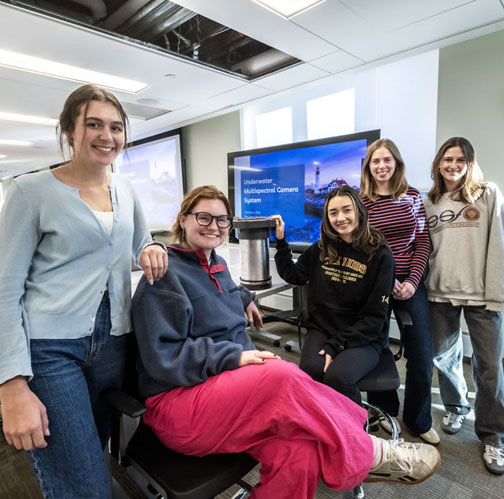
Building a tradition
Just a few months away from becoming the inaugural class of graduates from the University’s Human-Centered Engineering program, 28 seniors—working in five teams—are undertaking their Senior Impact Projects and preparing to present their results next month.
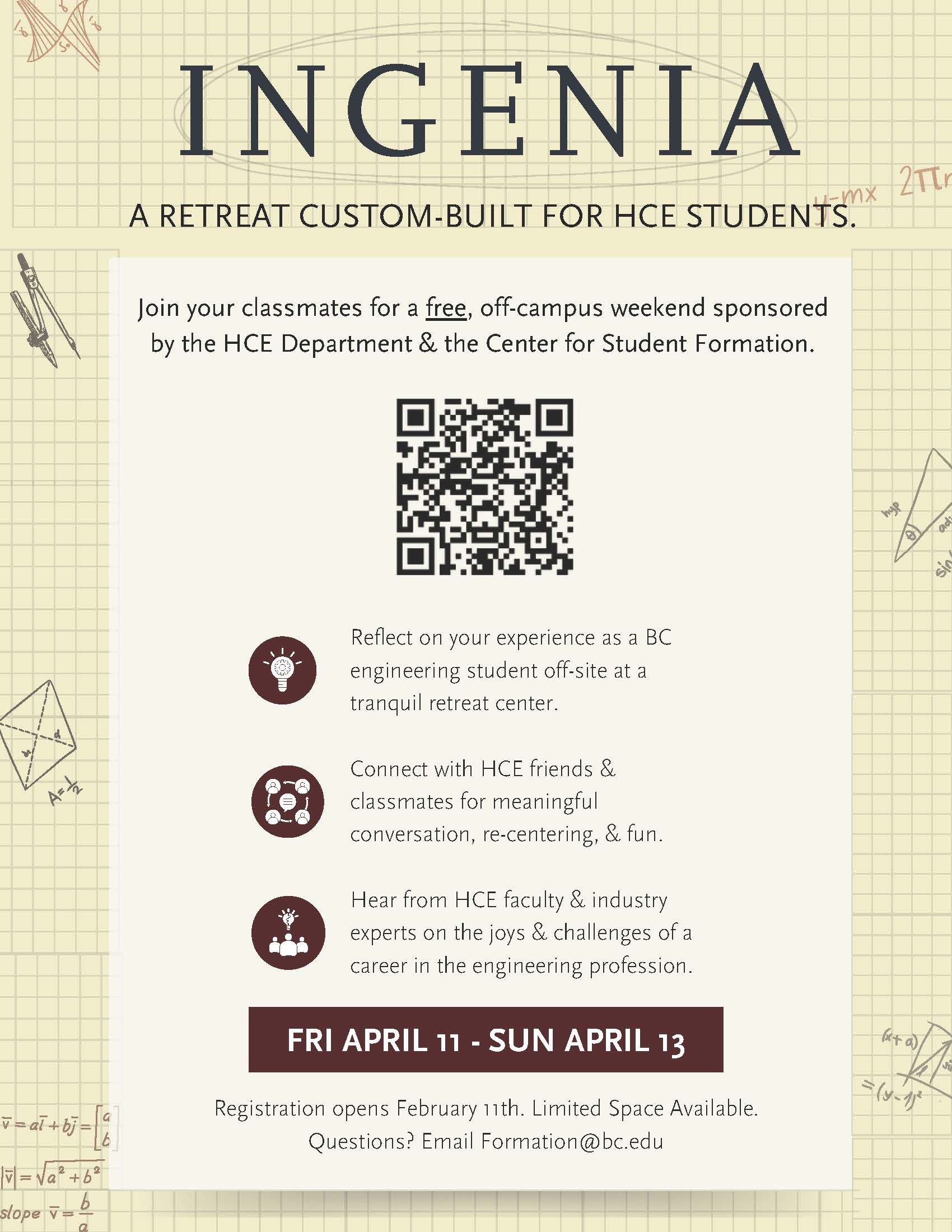
INGENIA Retreat for HCE Students

Heartfelt Homecoming
John W. Kozarich ’71, who has served as chair, CEO, or director of seven companies during his distinguished 47-year career in academia and the biopharmaceutical industry, and who endowed Boston College’s Department of Engineering Chair in 2021, returned to the Heights in late October for a three-day visit that included student and faculty meetings, a chemistry lecture, a football game, and some ruminating about the University, past and present.
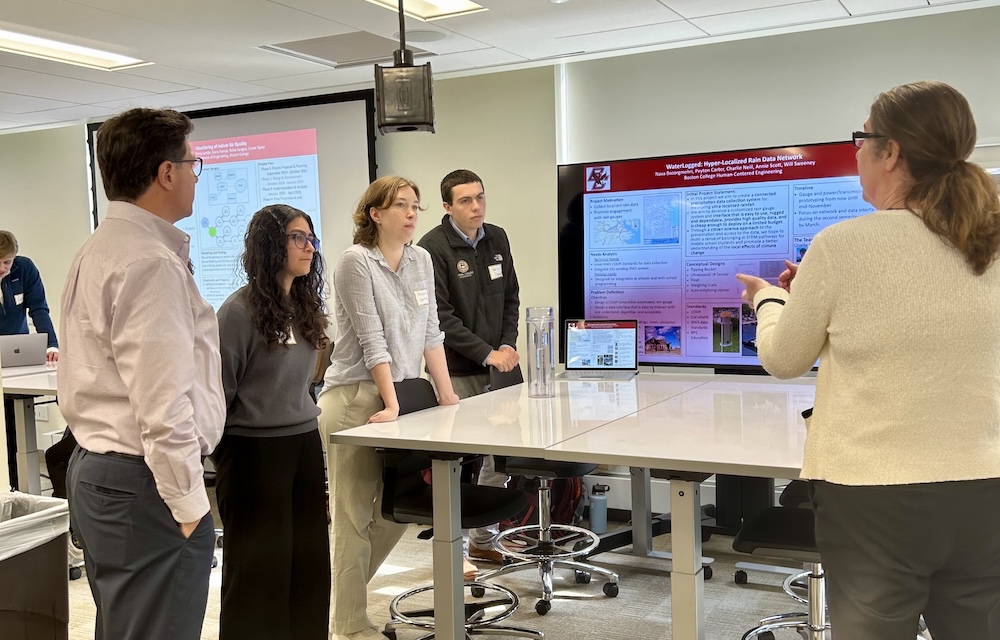
Senior Impact Projects
On October 17, students in ENGR4102: Senior Impact Project presented updates on their capstone design projects to the Engineering Advisory Board, both in person and online. The class of 2025 continues to demonstrate their mastery of the human-centered mindset as they collaborated in teams to create solutions for real people, destigmatize problems, and broaden the accessibility of resources to all.
.jpg)
Interdisciplinary BC team to work with high school STEM instructors
An interdisciplinary Boston College team from the Engineering Department and the Lynch School of Education and Human Development has been awarded a three-year, $600,000 grant from the National Science Foundation that will help prepare high school STEM instructors to teach engineering in public school systems.
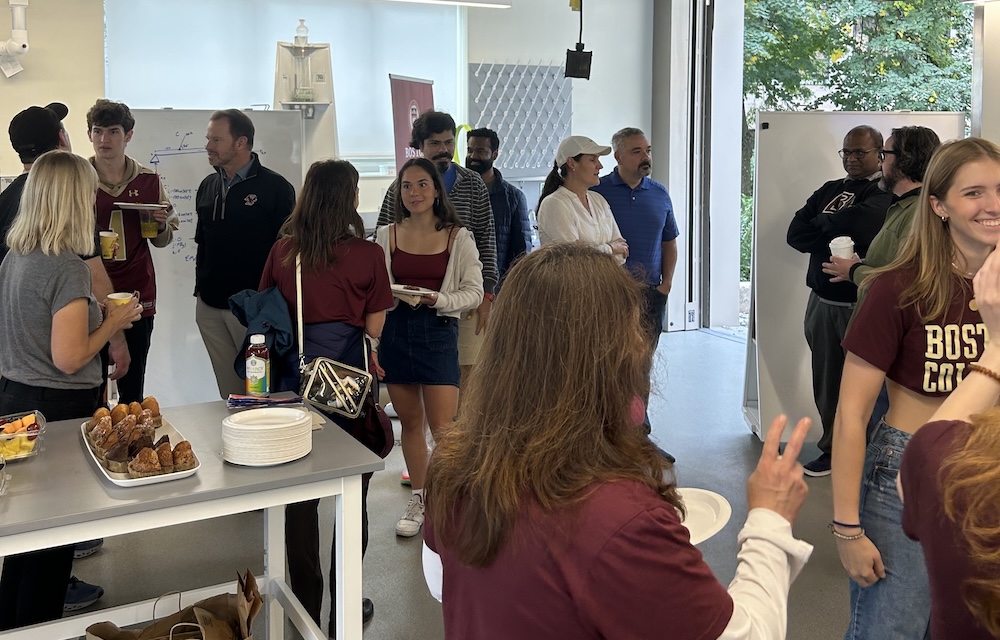
Family, Food, and Football
Our third annual Family Weekend Tailgate on Saturday, September 28, was a day full of smiles, touchdowns, and lots of food. It is always a pleasure to meet the people that have shaped our students into who they are, strengthening and spreading our community past the bounds of our Chestnut Hill campus.
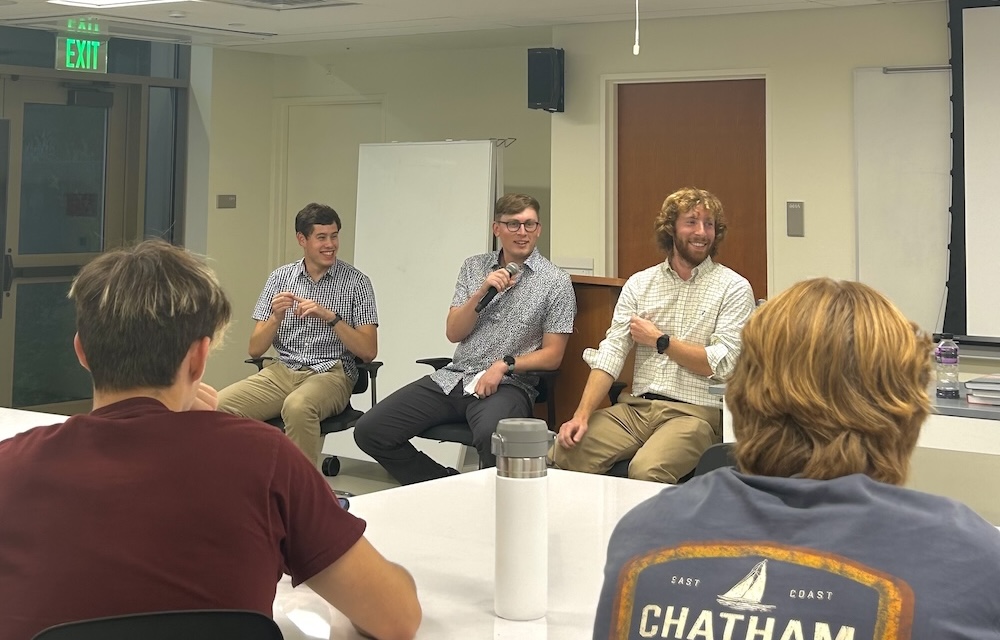
Meeting Mondays
As a part of the HCE Career Series that launched this fall, Meeting Mondays are designed to expose our students to the wide variety of opportunities that lie ahead of them and inspire them to take initiative of their futures. On the third Monday of every month, guest speakers have been visiting and talking through their unique paths from education to the workplace. (And sometimes back to school again!)

Making the Modern World Design Conference
Freshmen in the Making the Modern World: Design, Ethics, and Engineering class presented their semester-long innovations centered around improving accessibility on campus. Makaylah Shaw Williams '28 said that the conference "was an incredible opportunity to showcase our work and ideas to parents, peers, and judges. It also provided valuable feedback to refine and improve our ideas further."

Red Bandanna Run
Every year, the Boston College Community is invited to run the Red Bandanna Run, the largest fund-raising event that is held to benefit the Welles Remy Crowther Charitable Trust. The Department of Engineering is proud to support the cause and honors the life of Welles by putting the needs of others at the forefront of innovation.